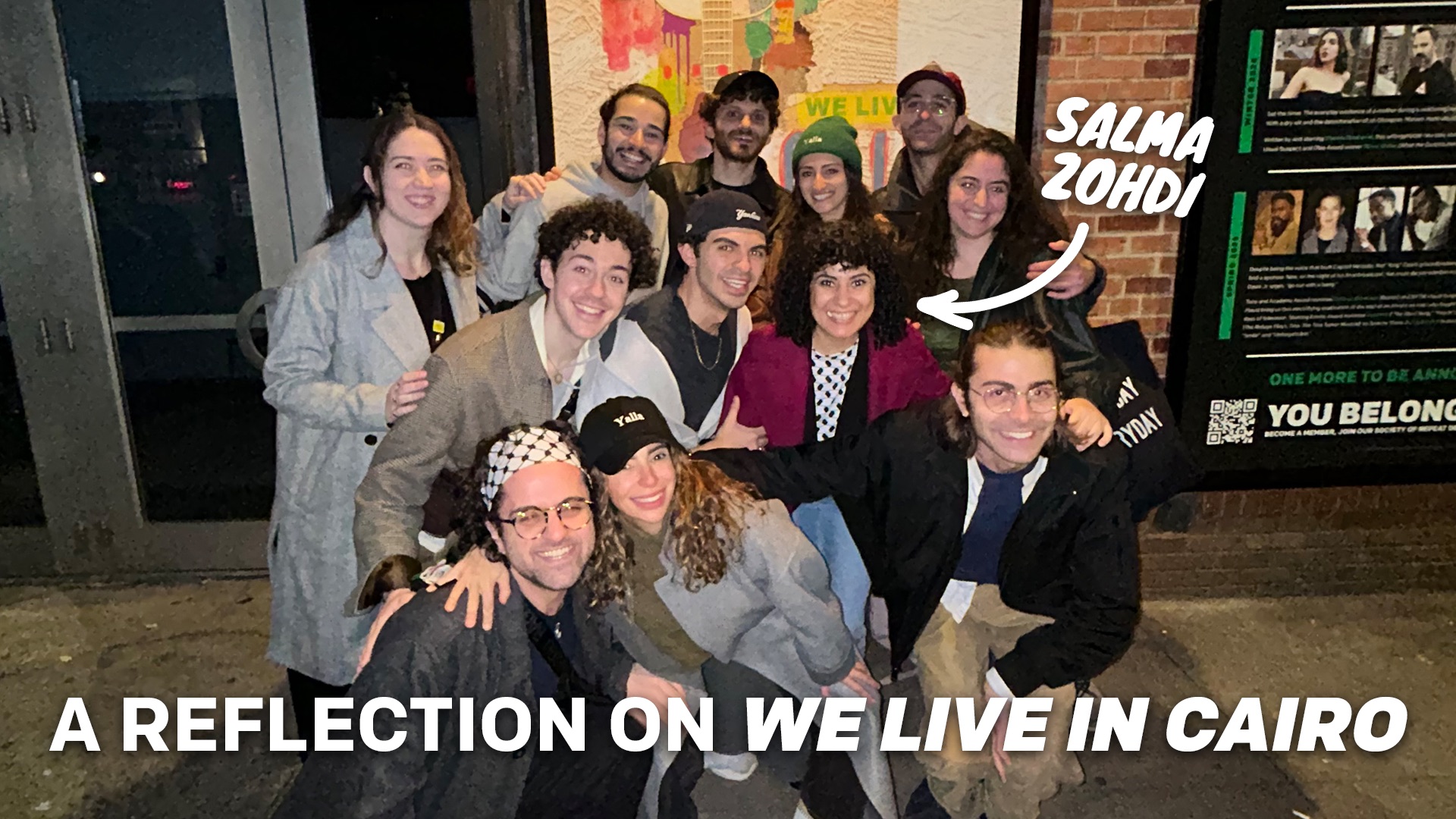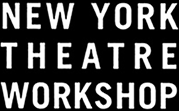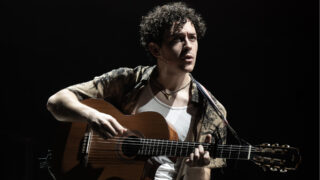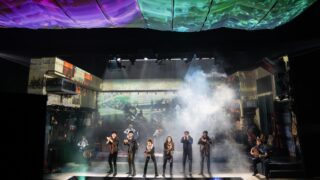


When We Live in Cairo came to NYTW, Literary Manager Salma Zohdi knew it would be a specific kind of experience. Not only would she be working in her capacity as an NYTW staff member, she was also the co-dramaturg of a piece that was about her homeland. In this deeply personal essay, Salma reflects on her journey with We Live in Cairo.
Reflections on We Live In Cairo
As We Live in Cairo closed its run at New York Theatre Workshop (NYTW) a couple of weeks ago, I’ve been reflecting on how significant this production has been for me—personally, artistically, and politically. This play brought the spirit of Cairo, its streets, and the revolution that still burns in my heart to one of New York’s most historic theatrical spaces. It was a deeply meaningful experience to bring Egypt—its complexities, its struggles, its soul—to the stage with an all-Arab/American cast at my artistic home, NYTW. This wasn’t just a show; it was a moment (and a movement) of real significance for the American stage, one that still feels deeply tied to the spirit of Tahrir Square.
We Live in Cairo is more than just a play. It’s about my home—Cairo, its streets, and especially Tahrir Square, where the chants of “Bread, Freedom, and Social Justice” echoed through the air. It’s about everything that makes Cairo feel like home—the music, the food, the headscarves, the keffiyehs, and the shisha. But more than that, it’s about the words we speak and the songs we sing when we demand change. This play is a tribute to that pivotal moment in 2011 when we Egyptians reclaimed our streets, took control of our narrative, and dared to dream of a better future. Like so many Egyptians, the spark that ignited in Tahrir Square stayed with me, shaping my identity and inspiring my work in theatre. In those moments of protest—of chaos and hope—I witnessed the power of storytelling: its ability to challenge the status quo, uphold truth, and give voice to the silenced. Similar to Amir’s anthem to Egypt in the play, working on this piece as NYTW’s Literary Manager and co-dramaturg was my personal anthem to Egypt, to the revolution, to the spirit of those still fighting for a better future, and to the six characters—Amir, Hany, Hassan, Karim, Fadwa, and Layla—who were inspired by those who were on ground in Tahrir over a decade ago.
Throughout my career, I have never felt more seen, supported, or inspired than during the process of putting on We Live in Cairo, and this is in large part due to the incredible team that made this show a reality. From direction and music to cast, crew, and the collective spirit that guided us, every person involved brought their whole selves to this project. We all knew the importance of carving out space for Arab voices in a landscape that has often excluded us, and understood the weight of having an all-Arab cast on an American stage, putting on a show that was so quintessentially Arab—especially at this moment with all the devastation that we are witnessing in our own home countries. This production was a labor of love, fueled by the belief that our stories deserve to be heard, our voices deserve to be seen, and our culture deserves to be celebrated. In addition to the cast, this production was shaped by an incredible team of both Arab, Arab/American, and non-Arab artists whose contributions elevated the play to new heights. The music was the heartbeat of this production, brought to life by extraordinary musicians whose sound connects directly to the soul of Cairo and Tahrir Square. It amplified the emotional impact of this story, grounding the play in a shared cultural and revolutionary spirit by bringing together Western and Arab instruments and themes—from the belly dancing at the start of the second act, to Fadwa’s mournful ode to Amir, and to the drum sound underlining Layla’s closing words “I’ll carry it all across the years… but we are here, so we will live here.” These moments enriched the storytelling in ways words alone could not. The collaboration across the entire creative team speaks to the power of storytelling and the richness that emerges when we make space for Arab voices, both onstage and behind the scenes.
Since moving to New York in 2013, I’ve been acutely aware of how Egyptian voices and stories are often overlooked on the Western stage. We Live in Cairo is changing that status quo, not just because it’s about Egypt’s past, but because it is part of a larger global conversation about the power of art to ignite change. Theatre connects us to the struggles of those whose voices are often erased, and I firmly believe We Live in Cairo is a huge step forward for the Egyptian, Middle Eastern, and North African (MENA) communities in New York and the U.S. The show provided an opportunity for NYTW’s Community Engagement and Marketing teams to create a series of For the Culture events that celebrated the community’s food, music, stories, and connections. These gatherings—panel discussions, masterclasses, and shared meals—allowed our community to engage with theater in a meaningful way, making them feel seen and celebrated by an artform that is not always readily accessible to us, whether we are immigrants ourselves or the children of immigrants. These efforts transformed the production into more than just a play; it became a platform for cultural exchange. It deepened the conversation around the play, introduced the Arab Spring to an American audience largely unfamiliar with it, and reached a generation who were too young at the time to understand what happened. Most importantly, it created a space where our MENA voices resonated far beyond the stage.
None of this would have been possible without Patrick and Daniel Lazour and Taibi Magar, who created not just a cultural moment but a beautiful and vibrant piece of theatre. They took an incredibly difficult and momentous story, treated it with care and generosity, and brought it to life, allowing the audience to see what Egyptians lived through in a whole new light. Their vision and respect for the story and its people allowed the play to flourish through rich, complex characters. It has been an honor to contribute to this vision, and I am deeply grateful for the trust they placed in me to help carry it forward. I’m also deeply blessed to have been part of a larger phenomenal team—Patricia McGregor, Aaron Malkin, the folks at Madison Wells, and everyone at NYTW—without whom none of this would have been possible.
We Live in Cairo and its characters brought #Cairo, #Tahrir Square, and the #January25 revolution to the American stage, and I will be forever changed for having been part of this transformative journey. This production was far more than just a job—it was a dream realized. To me, this play is for the Egypt that once was and the Egypt that many still hope to see come to life, but it is also for everyone who fights for a better future, and especially for those fighters whose stories are erased or ignored. It is my own personal anthem and ode to the 60,000 unjustly imprisoned in Egyptian jails—people like Alaa Abdel Fattah, Ayman Mousa, Ashraf Omar, and countless others. It’s for the martyrs who gave their lives for Egypt’s freedom—Khaled Said, Mina Daniel, Emad Effat, Shaimaa al-Sabbagh—and all those whose names will never be forgotten.
We Live in Cairo is for revolutionaries, dreamers, fighters, storytellers, survivors, and anyone who dares to hope for a better future. This play is for you, and for the people who will never stop fighting for justice—no matter the cost.
#TahrirIsNowAndForever
You might also like:
Explore more
Categories: 2024/25 Season. Tags: Salma Zohdi, The Lazours, and We Live in Cairo.

 My Cart
My Cart My Account
My Account Gift Certificates
Gift Certificates Find Us
Find Us






